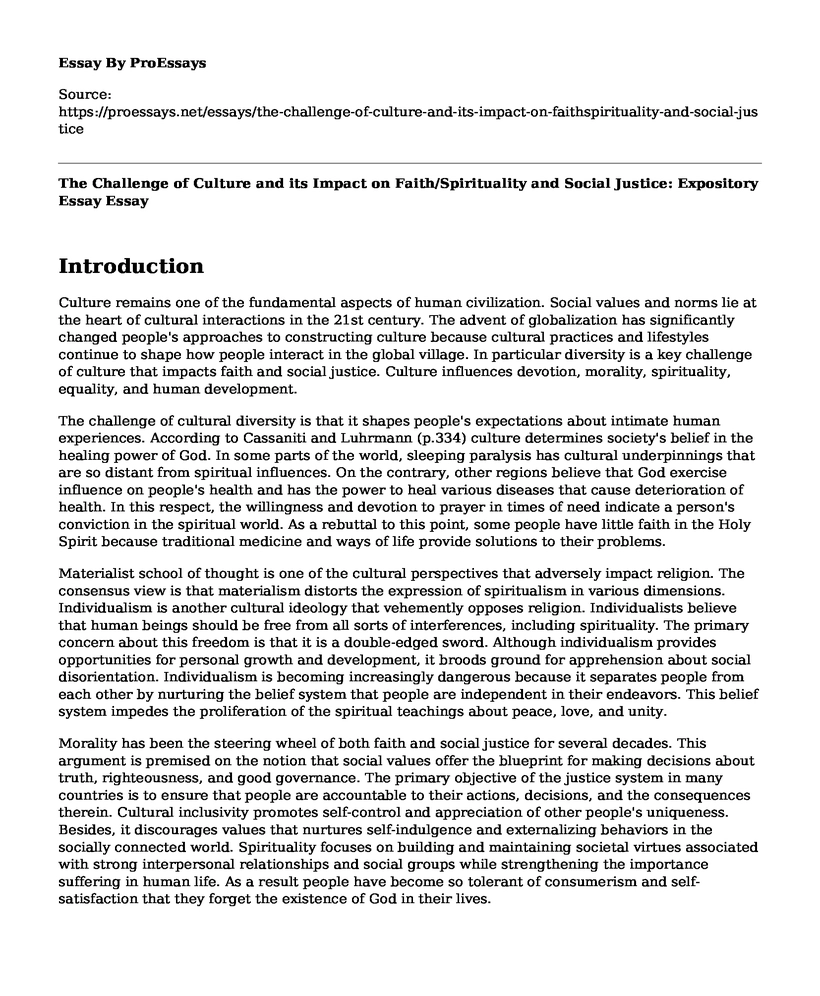Introduction
Culture remains one of the fundamental aspects of human civilization. Social values and norms lie at the heart of cultural interactions in the 21st century. The advent of globalization has significantly changed people's approaches to constructing culture because cultural practices and lifestyles continue to shape how people interact in the global village. In particular diversity is a key challenge of culture that impacts faith and social justice. Culture influences devotion, morality, spirituality, equality, and human development.
The challenge of cultural diversity is that it shapes people's expectations about intimate human experiences. According to Cassaniti and Luhrmann (p.334) culture determines society's belief in the healing power of God. In some parts of the world, sleeping paralysis has cultural underpinnings that are so distant from spiritual influences. On the contrary, other regions believe that God exercise influence on people's health and has the power to heal various diseases that cause deterioration of health. In this respect, the willingness and devotion to prayer in times of need indicate a person's conviction in the spiritual world. As a rebuttal to this point, some people have little faith in the Holy Spirit because traditional medicine and ways of life provide solutions to their problems.
Materialist school of thought is one of the cultural perspectives that adversely impact religion. The consensus view is that materialism distorts the expression of spiritualism in various dimensions. Individualism is another cultural ideology that vehemently opposes religion. Individualists believe that human beings should be free from all sorts of interferences, including spirituality. The primary concern about this freedom is that it is a double-edged sword. Although individualism provides opportunities for personal growth and development, it broods ground for apprehension about social disorientation. Individualism is becoming increasingly dangerous because it separates people from each other by nurturing the belief system that people are independent in their endeavors. This belief system impedes the proliferation of the spiritual teachings about peace, love, and unity.
Morality has been the steering wheel of both faith and social justice for several decades. This argument is premised on the notion that social values offer the blueprint for making decisions about truth, righteousness, and good governance. The primary objective of the justice system in many countries is to ensure that people are accountable to their actions, decisions, and the consequences therein. Cultural inclusivity promotes self-control and appreciation of other people's uniqueness. Besides, it discourages values that nurtures self-indulgence and externalizing behaviors in the socially connected world. Spirituality focuses on building and maintaining societal virtues associated with strong interpersonal relationships and social groups while strengthening the importance suffering in human life. As a result people have become so tolerant of consumerism and self-satisfaction that they forget the existence of God in their lives.
Conclusion
On logical grounds, it could be claimed that America is an oasis of religiosity predominantly secularized developed world. As O'Callaghan (p.35) correctly reported, the growth of crime and inequality in the United States ascertains the adverse effect of individualism on social justice. Popular culture has progressively become a crucial predictor of crime, especially youth suicide. One compelling justification of the effect of pop culture of crime the sense of autonomy of choice and self-control ingrained in the American individualistic culture. Worse still, social belief systems have eroded religious values, thereby reducing the importance of faith. Belief systems such as American bureaucracy, political ideologies, and corruption have been institutionalized. The inevitable consequence of this institutionalization is that religion has been rendered so rigid and sclerotic that it has become an instrument of abuse and oppression.
Works Cited
Cassaniti, Julia L., and Tanya M. Luhrmann. "The Cultural Kindling of Spiritual Experiences." Current Anthropology, vol. 55, no. S10, 2014, pp. S333-S343.
O'Callaghan, Paul. "Cultural challenges to faith: a reflection on the dynamics of modernity." Church, Communication and Culture, vol. 2, no. 1, 2017, pp. 25-40.
Cite this page
The Challenge of Culture and its Impact on Faith/Spirituality and Social Justice: Expository Essay. (2022, Feb 12). Retrieved from https://proessays.net/essays/the-challenge-of-culture-and-its-impact-on-faithspirituality-and-social-justice
If you are the original author of this essay and no longer wish to have it published on the ProEssays website, please click below to request its removal:
- Essay Sample on Sicilian Mafia
- Being Peace by Thich Nhat Hanh - Essay Sample
- Essay Example on Decriminalization of Prostitution: The Dark Side
- Essay Sample on Fight the Power: The Legacy of Civil Rights & Black Power Songs
- Essay Example on Embargo: Deterring International Trade & Securing Global Peace
- American Youth Incarceration: Race Disparities in Justice System - Essay Sample
- The Bible's Influence on India: A Study in Mangalwadi's Book - Essay Sample







